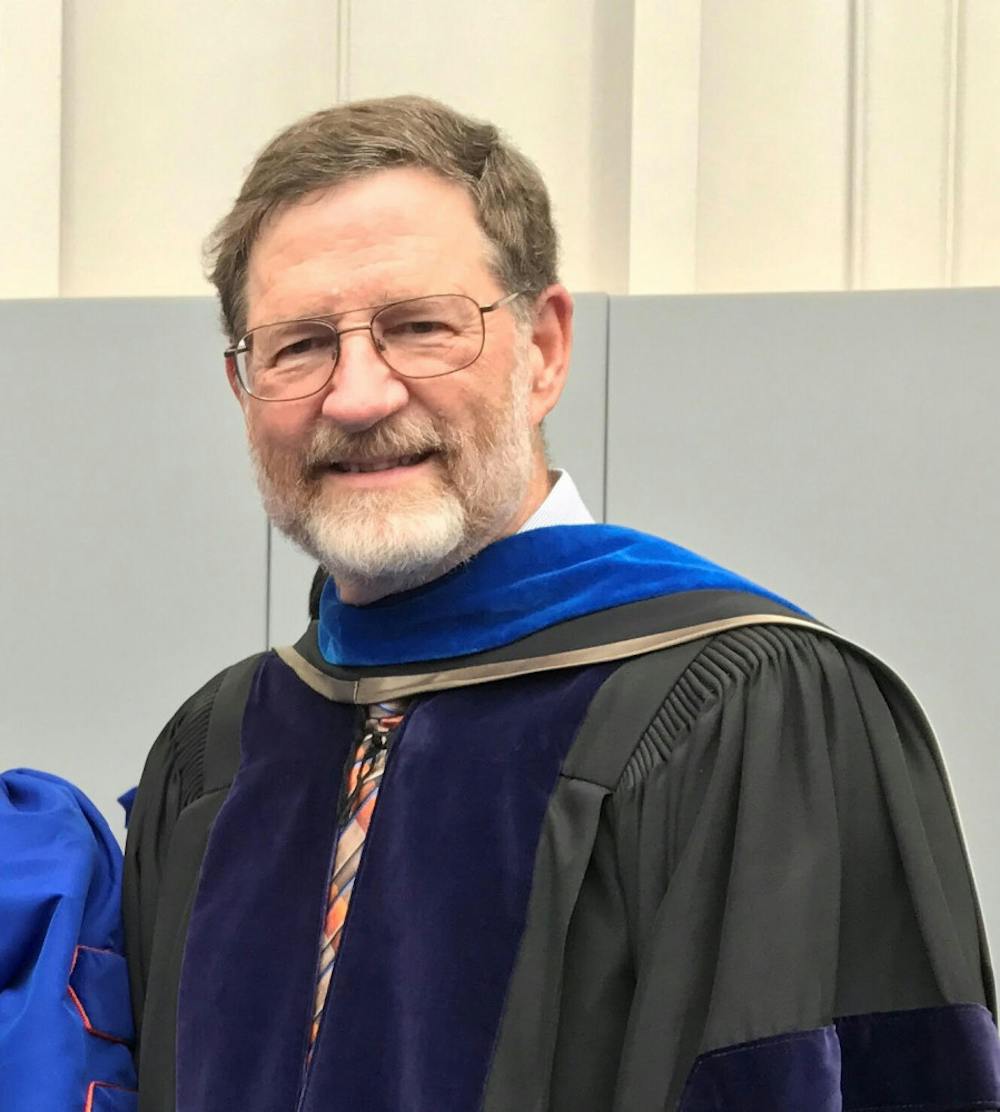From beginning to end, the second floor of the UF chemistry lab building is lined with posters of inventor Richard Yost’s work — much like a museum.
But the 66-year-old UF chemistry professor’s greatest recognition will take place September 20 in Tampa when he gets inducted into the Florida Inventors Hall of Fame for a life-saving device the world didn’t know it needed: the triple quadrupole mass spectrometer.
The Hall of Fame honors inventors who have made life-changing discoveries that impact Florida and other parts of the U.S., according to its website.
For the past 40 years, the $250,000 tool created by Yost and his former professor Chris Enke at Michigan State University has reshaped analytical chemistry. The spectrometer is used to measure the weight of molecules, Yost said.
Today, it’s used around the world for newborn testing, Navy research, environmental analysis, drug testing for the Olympics, blood testing and many other applications.
Their inspiration for the spectrometer came from wanting to computerize manual scientific tools, which was a new idea in the 1970s, Yost said.
About 20 years before, German inventor Wolfgang Paul invented the quadrupole, a ring of four poles wrapped together that sorts out ions by weight.
“This quadrupole is a beautiful, simple device, and I knew in graduate school I wanted to do something with it and mass spectrometry,” Yost said.
Before Yost’s invention, mass spectrometry — the study of the mass and charges of ions — was not widely used in chemistry.
Ions are simply atoms or molecules with electrical charges, and they help scientists understand the chemical makeup of things. There are many molecules with the same mass, so scientists need a way to identify which ones they’re working with, Yost said.
Yost, an eager student with a chemistry background, convinced himself he could find a new efficient way to find the weight of molecules with a quadrupole.
At the time, scientists who didn’t use quadrupoles to weigh molecules relied on a process that involved curving ions by putting an ion beam into a magnet to create an electromagnetic field. Smaller ions curved more than larger ones. Yost said it was just like it sounded: complex and time-consuming.
The triple quadrupole mass spectrometer instead turns molecules into ions by placing a charge on the compound. Parts of the molecule, which can then be individually weighed and identified, are separated using an electrical field, he said.
The device, made of three quadrupoles in a row, was a breakthrough, Yost said.
“I sat down and wrote a proposal to the National Science Foundation to build this instrument, and the reviews were quite consistent: it was a stupid idea, this would never work and we didn’t know what we were talking about,” he said. “So, it wasn’t funded.”
It was frustrating, but Yost’s team didn’t give up.
He sent the invention proposal to the Office of Naval Research not knowing if the Navy could benefit from using his device in its nuclear submarines, he said.
“I’m an internal optimist,” Yost said.
With the money the Navy provided, Yost bought several thousand pounds of stainless steel and a few hundred pounds of electronics. Then, he built the device with Enke.
The device that took almost three years to make was swiftly patented, and within months, it was selling commercially, Yost said.
“It’s become the most used mass spectrometer in the world,” he said.
About 15 million babies are tested for 100 diseases a year using the spectrometer, Yost said.
Enke, now retired, said he’s happy for his former student, who he remembers as a good experimentalist to work alongside.
Enke, 86, knew the device would change science when everyone told him and Yost that their plans were impossible.
The “impossible” discovery led to very successful careers for him and Yost. They both received many awards for their invention, Enke said.
“It’s impressive to cover a wall with achievements, but in the end, it’s the experience that you keep,” he said.
A friend of Yost said he’s receiving so many awards now because he’s old.
“You’re over the hill going down the other side,” Yost said jokingly. “They want to give you all the awards before you die.”
The College of Liberal Arts and Sciences dean, David Richardson, said he’ll be attending Yost’s Hall of Fame induction ceremony.
When a faculty member is recognized for a lifetime of hard work, it’s very important to the university to recognize their work, he said.
“Dr. Yost has been extraordinarily productive his entire career, and I have no sense he’s slowing down,” Richardson said.
UF is a research university that produces tons of publications and books, but people forget invention is also an indicator of a strong research department, he said.
At UF, Yost is the head of analytical chemistry, teaches as a chemistry professor, works in laboratory medicine and oversees the Southeast Center for Integrated Metabolomics.
“Innovation, serendipity and persistence are the three critical features of science,” he said.
In the past, Yost has served as a member of the university’s Board of Trustees and the Florida Board of Governors, which oversees the 12 state universities in Florida, he said. The professor was also on the hiring committee for current UF President Kent Fuchs.
Yost said he would have continued a career in administration, but he enjoyed chemistry too much to leave it behind.
After working with over 120 graduate students over his career, Yost advises ambitious research students to find a good mentor.
“Now’s the time to develop your skills to be an independent creative scientist,” he said. “Then maybe you’ll be lucky like me.”
Richard Yost, 66, pictured in April 2019 at a PhD commencement ceremony where he escorted his most recent PhD graduate student.






